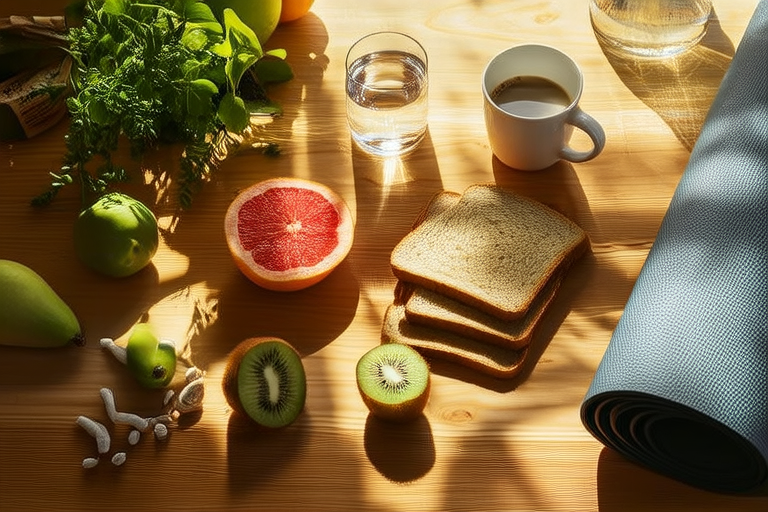Transforming Daily Living Habits for Better Health
Living a healthier life is often perceived as an arduous task that requires significant time and effort. However, making small, manageable changes to your daily routine can significantly enhance your overall well-being. By incorporating regular physical activity, improving sleep quality, adopting a balanced diet, practicing stress management techniques, and staying hydrated, you can transform your daily living habits to promote better health. These changes may seem minor individually, but collectively they can lead to substantial improvements in your physical and mental health.
Incorporate Regular Physical Activity into Daily Routines
Physical activity is crucial for maintaining good health. It helps in weight management, strengthens muscles and bones, and improves cardiovascular health. Regular exercise also releases endorphins, which are chemicals in the brain that act as natural painkillers and mood elevators. Even small amounts of physical activity can make a big difference. For instance, taking the stairs instead of the elevator or walking to work can increase your heart rate and burn calories. Additionally, engaging in activities such as yoga or tai chi can help improve flexibility and balance. Incorporating regular physical activity into your daily routine does not have to be overwhelming. Start with short walks or gentle stretching exercises and gradually increase the intensity and duration of your workouts as your fitness level improves.
Improve Sleep Quality and Duration
Sleep is essential for physical and mental health. During sleep, the body repairs tissues, synthesizes proteins, and consolidates memories. Lack of sleep can impair cognitive function, weaken the immune system, and increase the risk of chronic diseases such as diabetes and heart disease. To improve sleep quality and duration, establish a consistent sleep schedule by going to bed and waking up at the same time every day, even on weekends. Create a restful environment by keeping your bedroom cool, dark, and quiet. Avoid caffeine and heavy meals before bedtime, as they can interfere with sleep. Engage in relaxing activities such as reading or listening to soft music before bed to signal to your body that it’s time to wind down. Prioritizing sleep can have a profound impact on your overall health and well-being, allowing you to feel more alert and energized during the day.
Avoid Processed Foods and Adopt a Balanced Diet Rich in Nutrients
The food we eat plays a significant role in our health. A balanced diet rich in nutrients provides the necessary fuel for the body to function optimally. Eating a variety of fruits, vegetables, whole grains, lean proteins, and healthy fats ensures that you get all the vitamins and minerals needed for good health. Processed foods, on the other hand, are often high in unhealthy fats, sugars, and sodium, and low in essential nutrients. Limiting processed foods and focusing on whole, nutrient-dense foods can help prevent chronic diseases and promote longevity. Additionally, paying attention to portion sizes and eating mindfully can help you maintain a healthy weight. Consider keeping a food diary to track what you eat and how it makes you feel. This can provide valuable insights into your eating habits and help you make informed choices about what to include in your diet. Over time, adopting a balanced diet rich in nutrients can lead to improved energy levels, better digestion, and enhanced mental clarity.
Practice Stress Management Techniques
Stress is an inevitable part of life, but chronic stress can take a toll on both physical and mental health. Prolonged exposure to stress hormones such as cortisol can lead to inflammation, weakened immunity, and increased risk of heart disease. Managing stress effectively is crucial for maintaining good health. Various techniques can help reduce stress, including mindfulness meditation, deep breathing exercises, progressive muscle relaxation, and journaling. Mindfulness meditation involves focusing on the present moment and accepting it without judgment. Deep breathing exercises involve taking slow, deep breaths to activate the parasympathetic nervous system, which promotes relaxation. Progressive muscle relaxation involves tensing and then relaxing different muscle groups to release tension. Journaling allows you to express your thoughts and feelings, providing an outlet for emotional expression. Incorporating these techniques into your daily routine can help you manage stress more effectively and improve your overall well-being.
Stay Hydrated Throughout the Day
Water is essential for life. It plays a vital role in many bodily functions, including regulating body temperature, transporting nutrients, and removing waste products. Dehydration can lead to fatigue, headaches, and impaired cognitive function. Drinking enough water is crucial for maintaining good health. The amount of water you need depends on various factors, including age, sex, activity level, and climate. As a general guideline, aim to drink at least eight cups (64 ounces) of water per day. You can also stay hydrated by eating water-rich foods such as cucumbers, celery, and watermelon. Avoid sugary drinks and excessive caffeine consumption, as they can dehydrate the body. Carrying a reusable water bottle with you throughout the day can serve as a reminder to drink water regularly. Staying hydrated can improve energy levels, enhance skin health, and support digestion.
Start Small and Gradually Integrate These Habits into Your Lifestyle for Sustainable Health Improvements
Making significant changes to your lifestyle can be challenging, especially if you are juggling multiple responsibilities. It is essential to approach these changes gradually and with patience. Start by incorporating one or two small changes at a time, such as taking a 10-minute walk after dinner or drinking a glass of water before each meal. As you become more comfortable with these new habits, gradually add more changes to your routine. Remember that sustainability is key to long-term success. Focus on making gradual, lasting changes rather than drastic, short-lived ones. Celebrate your progress along the way, no matter how small it may seem. By starting small and gradually integrating these habits into your lifestyle, you can achieve sustainable health improvements that will positively impact your overall well-being.










